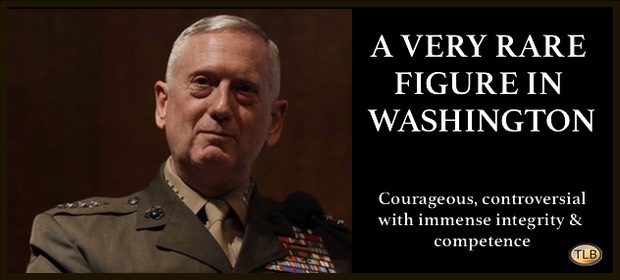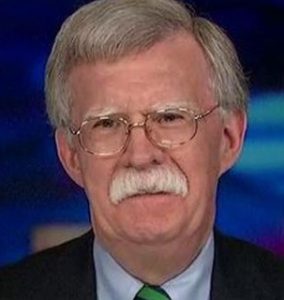
The Perils of Integrity: U.S. Defend Secretary James Mattis Resigns
DR. ALAN NED SABROSKY
General James Mattis (US Marine Corps, ret.), the U.S. Secretary of Defense, resigned on December 20, 2018, effective the end of February 2019. The immediate reason was a fundamental policy difference with President Trump on a variety of fronts, as spelled out in a characteristically blunt – some might say brutal – letter of resignation. But fundamental policy differences at Cabinet level rarely lead to voluntary resignations, as opposed to resignations tendered in lieu of being fired outright: the last one in the U.S. was the 1980 resignation of Secretary of State Cyrus Vance in protest against then-President Carter’s plan (if one can dignify it with that term) to try to rescue American hostages held in the U.S. Embassy in Tehran (it failed miserably).
The Mattis Resignation Reprised
General Mattis – he never seems to have stopped thinking of himself in that way, even though he never put on a uniform in his Cabinet position – was a controversial figure. His nickname of “Mad Dog” conveyed a carefully cultivated image, and was even used by President Trump when he announced his  nomination in December 2016. Many people disliked some or all of his policy decisions. But he was a fine Marine, a highly experienced commander, an intelligent and thoughtful professional, and from all I have heard and read, perhaps the most admired general within the Marine Corps since the iconic Lewis “Chesty” Puller (who won five Navy Crosses).
nomination in December 2016. Many people disliked some or all of his policy decisions. But he was a fine Marine, a highly experienced commander, an intelligent and thoughtful professional, and from all I have heard and read, perhaps the most admired general within the Marine Corps since the iconic Lewis “Chesty” Puller (who won five Navy Crosses).
All of these qualities put him in sharp contrast to the usual political animals appointed in the U.S. by presidents of both parties to run the Defense Department. Indeed, he was the first person to serve as Secretary of Defense since General of the Army George Marshall in 1950-51 who actually knew a great deal about defense – a damning indictment of how the U.S. picks its Defense Secretaries.
More importantly, he was not only President Trump’s first cabinet appointment, he was easily the most popular one – perhaps the only truly popular one – on both sides of the aisle on Capitol Hill. He was widely seen as a factor of thoughtfulness, discipline and stability in an otherwise turbulent and often chaotic  White House policy arena, along with two other retired generals also raised at different times to senior positions: H. R. McMaster (Lieutenant General, U.S. Army) as National Security Adviser, and John Kelly (General, U.S. Marine Corps – pictured) as White House Chief of Staff – Mattis and Kelly were particularly close. Now all three are going or gone, and I confess when I heard not long ago that Kelly was leaving at the end of December, I surmised that it was only a matter of time – a very short time – until Mattis also left.
White House policy arena, along with two other retired generals also raised at different times to senior positions: H. R. McMaster (Lieutenant General, U.S. Army) as National Security Adviser, and John Kelly (General, U.S. Marine Corps – pictured) as White House Chief of Staff – Mattis and Kelly were particularly close. Now all three are going or gone, and I confess when I heard not long ago that Kelly was leaving at the end of December, I surmised that it was only a matter of time – a very short time – until Mattis also left.
And Now?
Now that has happened, and President Trump – who did have a great deal of promise – is without three people with an exceptional combination of professional competence and integrity. I would like to say that Trump – whose behavior in office increasingly strikes me as that of a modern-day and much wealthier Mussolini with hair – will appoint highly qualified successors to Mattis and Kelly.
But precedent argues against it. He replaced McMaster with John Bolton (pictured), an unabashed neo-conservative and “Israel-Firster” who was an ardent advocate of the needless and appalling U.S.-led invasion of Iraq in  2003 – like most of his kind, he likes wars but managed never to have served in one. The list of likely candidates to replace Kelly reads like the sort of a horror show to make professionals in the Defense Department think of early retirement, however politically appealing they might be to Trump. I shudder to think who will be nominated to replace Mattis, whose shoes will be very hard to fill in the best of times and worlds.
2003 – like most of his kind, he likes wars but managed never to have served in one. The list of likely candidates to replace Kelly reads like the sort of a horror show to make professionals in the Defense Department think of early retirement, however politically appealing they might be to Trump. I shudder to think who will be nominated to replace Mattis, whose shoes will be very hard to fill in the best of times and worlds.
General Mattis did not do as much as I would have liked to have seen him do, or even attempt. And I certainly did not agree with every one of his decisions. But he had knowledge, professional competence, courage and integrity to a degree rarely seen in Washington, much less as Secretary of Defense. He will be sorely missed. But writing as a former Marine, I just hope I might have the opportunity to shake his hand someday.
_____________________________________________________________
Dr. Alan Ned Sabrosky (PhD, University of Michigan) is a ten-year US Marine Corps veteran. He served two tours in Vietnam with the 1st Marine Division and is a graduate of the US Army War College. He can be contacted at [email protected]




